 zachary harden
zachary harden
Keywords: hungary | budapest | buda | pest | lion | castle | danube |
Links: FOTW homepage | search | disclaimer and copyright | write us | mirrors

Last modified: 2023-06-03 by  zachary harden
zachary harden
Keywords: hungary | budapest | buda | pest | lion | castle | danube |
Links: FOTW homepage |
search |
disclaimer and copyright |
write us |
mirrors
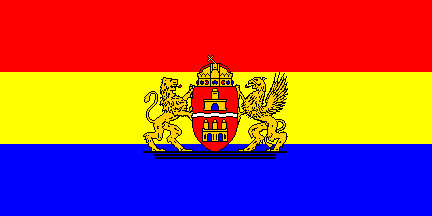
1:2 variant
image by István Molnár, 9 April 2001
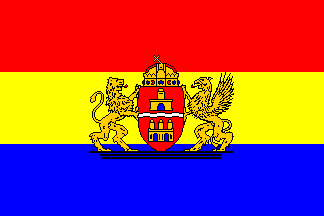
2:3 variant
image by Antonio Martins, 25 October 2000
Use of flag is abandoned on 24 February 2011 by Mayor of City of Budapest
See also:
Other Sites:
Horizontally divided red-yellow-blue with the city's coat of
arms in the center. The blue shade is very bright and strong
(like Sweden's) and the flag appears to be 3:2. The coat of arms
has the same crest as on the national and the shield is red, a
wave silver horizontally dividing two castles, representing Buda
and Pest -- the castles are not regular heraldic ones, but a
(styled) representation of actual monuments. Two golden lions
rampant support the shield. Budapest is combined from two major
parts: Buda - on the western bank of the Danube, and Pest - on
the eastern bank of the Danube. Both parts were united in 1872 to
one city.
Antonio Martins , 9 May 1997
There were several reports that the blue stripe was replaced by
green one. It seems that this is not so.
Željko Heimer , 10 May 1997
The flag of the city of Budapest, Hungary, is shown here as
being a horizontal tricolor of red-yellow-blue. However, in the
Crampton book "The Complete Guide to Flags," the flag
of Budapest is described as "3 horizontal stripes of red,
yellow, and green with the city arms in the center" on page
64. Did the flag design change between the book's printing (1989)
and the observations (1997)?
Randy Young, 29 January 1999
IIRC, some groups (if they were organized groups at all?)
wanted Budapest flag to change from blue to green, due to the
similarity, as they put it, with the flag of Romania and
possibility of misinterpretation due to that. To my understanding
the issue was rather irrational and nationalistically coloured, and
I guess that the officials did not take it seriously. In any
case, flags with blue are still used, as I can testify, as well
as some others that visited Budapest recently. As far as I know
green version was never used. The issue was raised in early 90's.
Red yellow and blue are colours taken from the Budapest coat of arms,
which is red with blue wavy bar and two castles one on each side
(a bit different, one to represent Buda and other Pest, the two
cities that Budapest is formed of, with Danube in the middle).
Since blue wavy line represent river Danube, it is hard to
interpret it as green.
However, I would not claim that "before my time" there
was not a different flag for Budapest, as I lack full
information.
Željko Heimer, 31 January 1999
Budapest came into existence in Fall 1873 out of three former cities: Óbuda (lit. "Old Buda"), Buda, and Pest. The
new flag for the new capital was designed based on the Hungarian
red-white-green tricolor: white became yellow and green became
blue. The red-yellow-blue tricolor with the city coat of arms remained the
flag of Budapest until the end of WW I (probably until 1920),
when it was officially changed to red-yellow-green with coat of arms.
Namely, in Fall/Winter 1919, after the collapse of the Soviet
Republic, along with the annexation of Transsylvania, the Partium,
the Banat, and Eastern Hungary, Romanian troops occupied
Budapest. Their blue-yellow-red tricolor became extremely
unwelcome in the capital. For this reason, Governor Horthy
(actually, he was elected in March 1920) ordered the above
mentioned change of the blue color. After WW II, almost all
county and city flags were abolished (an exception is Szeged,
which used its city flag--Communist version--in the 1980s). After
liberation, in or around 1990, the new city council decided to
re-establish the original, 1873 flag. From that time on, the
state flag or the national flag is (almost) always hoisted along
with the Budapest flag.
David N. Biacsi, 4 February 1999
The flag was adopted in 30th September 1990 by the Soviet of
the Capital (before the elections of the councils). The correct
flag (that I know) is the 1:2 version.
István Molnár, 12 October 2000 and 9 April 2001
The change of the colours (blue/green) was in 1930! The
red-yellow-blue flag was used 1873-1930.
The red-yellow-green flag was used 1930-1946/1950. The present
flag is the red-yellow-blue from 1989.
István Molnár, 19 October 2000
![[Budapest flag]](../images/h/hu-budap.gif)
image by Antonio Martins, 28 Febuary 2001
The flag without the arms is also in use.
Željko Heimer , 10 May 1997
The official version is the 2:3
István Molnár, 27 May 2001
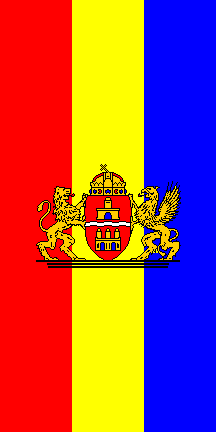
image by István Molnár, 9 April 2001
1)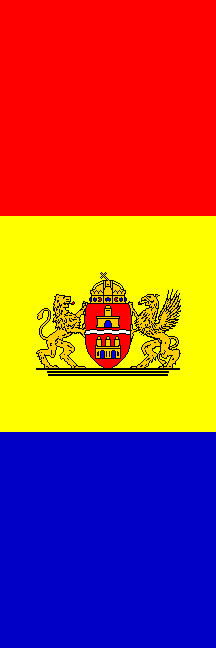
image by István Molnár, 27 August 2001
Flying flag at the Conquest Statue, Opusztaszer NHP. Ratio:
3:1. The width of the coat of arms is the 1/3 of the width of the flag.
The coat of arms is on the 1/3 of the flag's height.
István Molnár, 27 August 2001
2)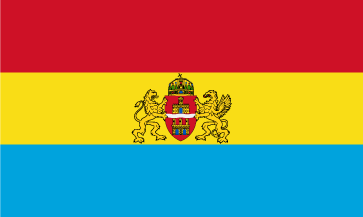
image by Johnny Andersson, 23 April 2007
I came across this variant
of the flag at <www.omniplan.hu>.
Colours in my image are approximate. Size of the arms is almost
the height of the yellow stripe.
Johnny Andersson, 23 April 2007
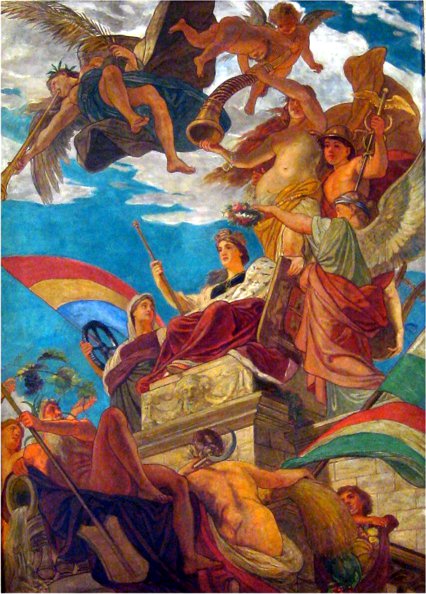
I recently came across
this picture of a painting (by Lotz Károly) on
the ceiling of the Paris Department Store (Párizsi Nagyáruház) of Budapest.
To my surprise, it shows two flags, one in the Hungarian colours but another in the
Romanian colours, horizontally placed however. I have searched for such a flag in the Hungarian pages of FOTW unsuccessfully. Any idea what it
can be?
Santiago Dotor, 13 January 2013
That was the old, recently replaced flag of
Budapest.
Alex Danes, 17 January 2013